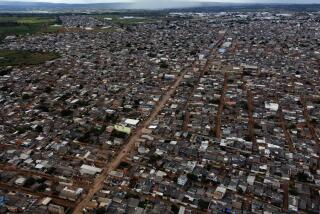Brazil’s economic slowdown so far leaves many unscathed
SAO PAULO, Brazil — If the Brazilian economic boom is over, that’s news to Maria da Conceicao Souza, who is standing in the scorching winter sun in Paraisopolis, Sao Paulo’s largest slum.
In the last six months, Souza has been able to set up her own beauty salon in the favela, shortly after bagging her first real job in her 36 years.
Business has been increasing steadily, she says, driven by customers from Brazil’s new middle class, whose rise out of poverty has been one of the most potent symbols of the country’s emergence as an economic power.
The recent halt in Brazil’s economic growth, which has made headlines and spooked investors, hasn’t affected life here, she says.
“Sincerely, this country is better than we ever thought it would be for us,” says Souza, who has even hired her 27-year-old cousin, Zildete Alagao de Souza. Until recently, both had worked only on and off, scraping by with day gigs cleaning the homes of the wealthy.
“The door is open to us now,” Maria says, “and no one I know thinks it closed. You just have to walk through.”
In an unusually pleasant slowdown, the unemployment rate is still at a record low, wages have risen, and more than 1 million jobs have been created this year, as people such as Souza and her cousin join 40 million other Brazilians who have risen out of poverty in the last decade.
“The great conundrum for a lot of economists is how you can have an economy that was growing at 7.5% just over a year ago and is now at zero, but with unemployment still dropping,” says Tony Volpon, a New York-based economist for international bank Nomura Securities.
Some analysts believe that if growth doesn’t pick up, it’s only a matter of time until the economic lull will spell consequences for average Brazilians, who, in a rare twist of events, have so far weathered the slowdown far better than the wealthy. The country’s richest man, Eike Batista, lost half of his $30-billion fortune this year in a matter of months, as investors sucked money out of the country’s stock exchange.
Souza is in many ways typical of Brazil’s new middle class, an example of how it has managed to grow despite the slowdown.
She and her cousin moved from the poor state of Piaui to the megalopolis of Sao Paulo to seek work, part of the vast 20th century migration from the northeast that ended up creating many of the favelas in Brazil’s richer cities.
The pair worked as diaristas, or domestic day laborers, a typical job for migrant women, and never expected much more. But last year Souza, who had always been interested in beauty and fashion, got a job at a salon in the city’s financial district. Within nine months, she had learned and saved enough to open her own place.
She borrowed about $3,000 to add to the $6,500 she had to open her shop, and in no time, she says, demand from neighbors allowed her to hire her cousin at the minimum wage of about $300 a month.
In the last month, she has also managed to bring on Angela, an 18-year-old who is supporting her 1-year old son.
The three women dance around one another in a tiny space open to the main street in a corner of Paraisopolis, attending to a constant stream of clients, despite more than a dozen other salons on the strip. At their Skin Color Salon, you can get a mani-pedi for $10, hair straightening for $75, or the latest craze, the “Californian” — meaning blue or purple tips — for $30.
The boom in demand for services helps to explain the paradox of low unemployment and low growth, analysts say. Although the industrial manufacturing sector has been suffering because of the high cost of Brazilian exports, local service businesses such as hair salons, restaurants and even banks are relatively labor-intensive, and have been buoyed — for now, at least — by freely spending Brazilians.
But that spending may not be so free as the economic squeeze tightens.
“If current trends continue, we will see a rise in unemployment,” says Volpon, who, like most economists, expects moderate growth to return to Brazil’s economy.
The country enjoyed a big push over the last decade from Chinese demand for commodities such as soybeans and iron ore, and social programs and wage increases put in place by former President Luiz Inacio Lula da Silva that directed more of that wealth to the country’s poor.
But as the current economic crisis rears its head along with the threat of a slowdown in China, the government here has become increasingly nervous, hoping that a stream of state stimulus packages will take effect and relying on long-term plans to harvest newly discovered offshore oil wealth.
“If growth doesn’t start again, this will hit people in their daily lives,” says Mark Weisbrot, co-director for the Center for Economic and Policy Research in Washington.
In Paraisopolis, no one is giving any indication they have begun to let up. As Souza and her cousin put their skills to work on a photo session with some young aspiring models from the neighborhood, construction workers hammer away at what will be a new shop on the dusty road.
Though the contrast with the expensive high-rises that tower over shacks just blocks away is shocking, the salon is on a street that was paved in the last year and is now home to a variety of stores, selling groceries, auto parts, school supplies, pet food and sandals.
It was news in the neighborhood that the stock market had taken a hit and wealthy Brazilians had lost millions in the downturn.
“If the rich are affected, that almost always means we will be too. So maybe this can’t last forever,” says Valdirene, a 31-year-old salon client, as she and the other women argue over whether the government really cares about them. “But this time, we hope it can.”
Bevins is a special correspondent.
More to Read
Sign up for Essential California
The most important California stories and recommendations in your inbox every morning.
You may occasionally receive promotional content from the Los Angeles Times.










